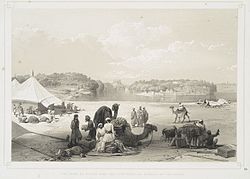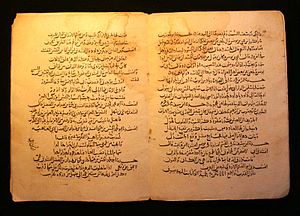Shah Abdul Latif Bhittai
From Wikipedia, the free encyclopedia
"Bhittai" redirects here. For other uses, see Bhittai Colony.
| Shah Abdul Latif Bhittai | |
|---|---|
 |
|
| شاه عبدالطيف ڀٽائي | |
| Born | Friday November 18, 1689 (6 Safar 1102 A.H.) Sui-Qandar (Bhit Shah) Hala, Sindh |
| Died | Saturday January 1, 1752 (14 Safar 1165 A.H.) Bhit Shah, Sindh |
| Influences | Muhammad Jalal ad-Din Muhammad Rumi Attār Shaikh Sa'adi Kabir |
| Influenced | Sachal Sarmast Bedil Shaikh Ayaz |
| Tradition/Genre | Poetry |
Contents
[hide]Bhittai's ancestry[edit]
According to most scholars, Shah Abdul Latif Bhittai's lineage goes back to the Khwarizim Shahs, others claim he was a descendant of Mohammad and grandson of Mohammad. He however used the term "Shah" as a surname.Shah Abdul Karim Bulri (1600s), whose mausoleum stands at Bulri, about 40 miles from Hyderabad, a mystic Sufi poet of considerable repute, was his great, great grandfather. His verses in Sindhi are existent and his anniversary is still held at Bulri, in the form of an Urs.
His father, Syed Habib Shah, lived in Hala Haveli, a small village, about forty miles from Matiari and not far from the village of Bhitshah. Later he left this place and moved to Kotri, where Shah Abdul Latif Bhittai spent some part of his adolescent life.
The early life[edit]
Shah Abdul Latif was born to Shah Habib in the village Hala Haveli a few miles to the east of the present town of Bhit Shah (named after him), on Safar 14, 1102 A.H. i.e. November 18, 1690 CE. Young Latif was raised during the golden age of sindhi culture. His first teacher was Akhund Noor Muhammad Bhatti, But, mostly, he was self-educated. Although he received little formal education, the Risalo gives us ample proof of the fact that he was well-versed in Arabic and Persian. The Qur'an, the Hadiths, the Masnawi of Maulana Jalaluddin Rumi, Shah Inayatullah, along with the collection of Shah Karim's poems, were his constant companions, copious references of which have been made in Shah Jo Risalo. He is also known for his famed Calligraphic, and hand written skills he made several copies of the Qur'an.His correspondence in Persian with contemporary scholar Makhdoom Moinuddin Thattvi, as contained in the Risala-i-Owaisi, bears witness to his scholastic competence.
| “ |
"Beloved's separation kills me friends, At His door, many like me,
their knees bend. From far and near is heard His beauty's praise, My
Beloved's beauty is perfection itself." .....Bhittai [Sur Yaman Kalyan] |
” |
Clouds return and once again, it rains, Lighting's flash from all sides, and with them, Some go to Istanbul others turn to the west, Some shine bright over China and others take care of, Samarqand, some wandered to Rome, to Kabul and Kandahar, some lie on Delhi, Deccan thundering over...My beloved Allah, may you always make Sindh a land of abundance, My beloved Allah, may you make prosperous the whole universe.
Shah Abdul Latif Bhittai, Sur Sarang, Shah Jo Risalo.
| “ |
"The next day I sat down, and listened to the Story of the
'Vairagis.' Their salmon-coloured clothes were covered with dust. The
lonely ones never talk to anyone about their being. They move about
unmarked amongst the common folk." ........Shah Latif Bhittai |
” |
Appearance and characteristics[edit]
In appearance, Bhittai was a handsome man, of average height. He was strongly built, had black eyes and an intelligent face, with a broad and high forehead. He grew a beard of the size of Muhammad's beard. He had a serious and thoughtful look about himself and spent much time in contemplation and meditation, since he was concerned about his moral and spiritual evolution with the sole purpose of seeking proximity of the Divine. He would often seek solitude and contemplate on the burning questions running through his mind concerning man's spiritual life:- Why was man created?
- What is his purpose on this earth? What is his relationship with his Creator?
- What is his ultimate destiny?
Shah's Journey of Sindh[edit]
In quest of religious truths, Shah Abdul Latif Bhittai traveled to many parts of Sindh and also went to the bordering lands as far as Multan, Lasbella, Jaisalmer and Bhuj. He became well known to the rulers at height of the power and rule of Kalhoras in Sindh. However he traveled unilaterally in the company of Jogis and Samis and some times alone visiting towns and cities, to understand the true message of Islam contained in nature. Throughout his travels he went to hills, valleys, riverbanks, fields and mountains where he met the ordinary simple people. He also traveled to the Ganjo Takkar( Barren Hills) in the south of Hyderabad, Sindh.His poetry contains the adventures of Samundis (Sindhi Sailors) and their voyage to Lanka and Java, in Sur Surirag and Sur Samundi, which feature various accounts on cultural,socialand economic outlook on people of Thatta and the port Debal in present day Karachi. For three years, he traveled with jogis and sanyasis, in search of the truth, peace, and harmony in the mountains of Lasbella. At several places in the Risalo, mention has been made of these jogis and of his visits to these wonderful, holy and peaceful places. He also traveled to such far away places in the Thar desert such as Junagadh, Jaisalmer.
Shah Abdul Latif Bhittai, Shah Jo Risalo
Piety and ascetism[edit]
By the time he was a young man of twenty one years, he began to be known for his piety, his ascetic habits and his absorption in prayers. Observation and contemplation were chief traits of his character. A number of people flocked round him adding to the already large number of his disciples. This aroused jealousy of some powerful, ruthless, tyrannical persons - landlords, Pirs, Mirs, and Rulers - who became his enemies for some time. Later, seeing his personal worth, and the peaceful and ascetic nature of his fame, abandoned their rivalry. At this time he was living with his father at Kotri, five miles away from the present site of Bhitshah. It was here that his marriage was solemnised in 1713 CE with Bibi Sayedah Begum, daughter of Mirza Mughul Beg. She was a very virtuous and pious lady, who was a proper companion for him. The disciples had great respect for her. They had no children.In the true ascetic spirit, Shah Latif was now in search of a place where in solitude, he could devote all his time in prayers and meditation. Such a place he found near Lake Karar, a mere sand hill, but an exotic place of scenic beauty, four miles away from New Hala. This place was covered by thorny bushes surrounded by many pools of water. It was simply and aptly called 'Bhit' (the Sand Hill). On the heaps of its sand stones he decide to settle down and build a village. As it was sandy, he along with his disciples dug out the hard earth from a distance and covered the sand with it to make the ground firm. After months of hard labour, carrying the earth on their heads and shoulders, the place was now fit enough for the construction of an underground room and two other rooms over it, along with a room for his old parents. A mosque was also built and the houses of his disciples properly marked out. In 1742, whilst he was still busy setting up a new village, Bhit, he got the sad news of the death of his dear father.. Soon after this Shah Latif shifted all his family members from Kotri to Bhitsah, as the village now began to be called. His father was buried there, in accordance to his will, where his mausoleum stands only eight paces away, from that of Shah Abdul Latif, towards its north.
The final years[edit]

Grand mausoleum of Bhittai built by Mian Ghulam Shah Kalhoro on 1762 AD
| “ |
لڳي لڳي وآءُ، وياانگڙا لٽجي، پيئي کني پساهه، پسڻ ڪرڻ پرين جي "Wind blew! The sand enveloped the body, Whatever little life left, is to see the beloved." |
” |
| “ |
"Tell me the stories, oh thorn-brush, Of the mighty merchants of the
Indus, Of the nights and the days of the prosperous times, Are you in
pain now, oh thorn-brush? Because they have departed: In protest, cease
to flower. Oh thorn-brush, how old were you When the river was in full
flood? Have you seen any way-farers Who could be a match of the
Banjaras? True, the river has gone dry, And worthless plants have begun
to flourish on the brink, The elite merchants are on decline, And the
tax collectors have disappeared, The river is littered with mud And the
banks grow only straws The river has lost its old strength, You big
fish, you did not return When the water had its flow Now it's too late,
You will soon be caught For fishermen have blocked up all the ways. The
white flake on the water: Its days are on the wane." ......Bhittai
[translated by Prof. D. H. Butani (1913-1989) in The Melody and Philosophy of Shah Latif |
” |
Those that all night keep awake, And Allah's name unceasingly
take, Their yearning Abdul Latif says, For all time unforgotten stays,
Among those that come before Allah for adoration, On them countless
more shall send their homages and prayers.
Shah Abdul Latif Bhittai, Shah Jo Risalo
The Urs[edit]
The Urs commences every year from 14th Safar (2nd month of Hijra calendar) and lasts for three days. Along with other features, like food fairs, open-air markets selling Ajrak and Sindhi Caps among others, and entertaining and competitive sports, a literary gathering is also held where papers concerning the research work done on the life, poetry, and message of Bhittai, are read, by scholars and renowned literary figures. His disciples and ascetics, singers and artists, gather around and sing passages from his Risalo. Scholarly debates and exhibitions of his work and traditional Sindhi artifacts are also organised.
| “ |
"Sleeping on the river's bank, I heard of Mehar's glory, Bells
aroused my consciousness, longing took its place, By God! fragrance of
Mehar's love to me came, Let me go and see Mehar face to face."
.....Bhittai [Sur Suhni] |
” |
Films[edit]
- So Heddan, So Hoddan[2] is a film by noted film makers Anjali Monteiro and KP Jayasankar of the Centre for Media and Cultural Studies, Tata Institute of Social Sciences, on the pastoral Fakirani "Jatoi community" in the Great Rann of Kutch, who sing Bheths of Bhitai.




No comments:
Post a Comment